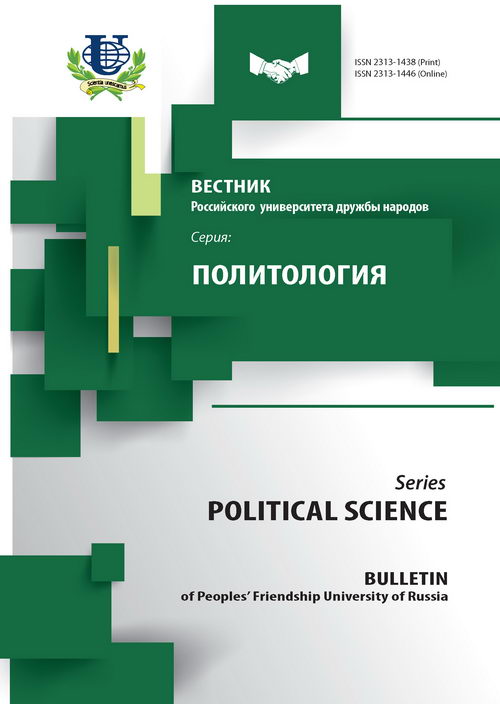№ 2 (2012)
- Год: 2012
- Статей: 12
- URL: https://journals.rudn.ru/political-science/issue/view/543
СТАТЬИ
Российско-китайские отношения в контексте сравнительного анализа культур
Аннотация
Развитие российско-китайских отношений зависит от множества факторов, среди которых особенно большое значение имеют культурные. В культурах России и Китая есть как сходства, так и различия. В обеих культурах коллективные ценности преобладают над индивидуальными и делается акцент на централизации власти. Однако по сравнению с культурой России китайская культура более секуляризирована и силу этого более рациональна и миролюбива. Кроме того, китайская культура отличается большей стабильностью и консервативностью, внутренним делам государства в ней уделяется больше внимания, чем внешней политике. На протяжении всей истории российско-китайских отношений различные культурные факторы оказывали сильное влияние на их развитие. На данный момент в отношениях между Россией и Китаем сложилась благоприятная тенденция, но в долгосрочной перспективе в их развитии существует неопределенность.
Вестник Российского университета дружбы народов. Серия: Политология. 2012;(2):5-28
 5-28
5-28


Этнос, нация и политика
Аннотация
В статье автором раскрывается сущность понятий «этнос», «нация», «этничность», «национальность». Анализируется содержание национальной политики в России, смысл которой, по мнению автора, состоит в обеспечении многообразных форм ее проявления, в том числе на основе современной модели федерации, которая позволяет реализовать право народов на самоопределение.
Вестник Российского университета дружбы народов. Серия: Политология. 2012;(2):29-36
 29-36
29-36


Значение инициатив России по формированию новой архитектуры европейской безопасности
Аннотация
Статья посвящена анализу позиции России в отношении основных тенденций развития современной системы европейской безопасности. Показывается значимость российских инициатив по созданию равной и неделимой системы коллективной безопасности, соответствующей новым глобальным трансформациям на мировой арене.
Вестник Российского университета дружбы народов. Серия: Политология. 2012;(2):37-52
 37-52
37-52


Политический процесс в Нигерии после тридцати лет военных режимов
Аннотация
Статья посвящена анализу перехода к гражданскому правлению после тридцати лет военных режимов в Федеративной Республике Нигерия. В статье рассмотрены проблемы политического процесса в стране и социально-экономические реформы президента Олусегуна Обасанджо.
Вестник Российского университета дружбы народов. Серия: Политология. 2012;(2):53-69
 53-69
53-69


«Синдром Виши»: политические проблемы переосмысления коллаборационистского прошлого
Аннотация
Данная статья посвящена процессам и результатам переосмысления французским обществом коллаборационистского режима, господствовавшего во Франции во время Второй мировой войны. Наследие данного периода оказало сильное воздействие на послевоенное развитие Франции, а также на ее положение в послевоенной Европе. Автор рассматривает ход и специфику преодоления прошлого в контексте конкретных исторических событий.
Вестник Российского университета дружбы народов. Серия: Политология. 2012;(2):70-79
 70-79
70-79


Специфика политической традиции в Латинской Америке на протяжении XIX и XX столетий. Насилие - ключевая проблема латиноамериканской политической жизни
Аннотация
В статье исследуются проблемы латиноамериканской политической жизни, общее и специфическое в ее традиции. Специальное внимание уделяется проблеме насилия, которая присуствует во всех аспектах жизни латиноамериканских обществ, во всех латиноамериканских государствах.
Вестник Российского университета дружбы народов. Серия: Политология. 2012;(2):80-90
 80-90
80-90


Стратегическая культура: понятие и направления исследований
Аннотация
Определение и оценка «политической квалификации» групп господства и долгосрочный прогноз их действий составляют первостепенную задачу стратегического анализа, которая имеет несколько граней и может решаться с помощью различных подходов и средств. Группы господства имеют определенные интересы, стратегическое управление которыми - успешное или бездарное - составляет существенную часть их «игрового» поведения, относительная результативность которого в определенные отрезки времени является более или менее вычисляемой. В свою очередь, «игровое поведение» групп господства сильно зависит от характеристик стратегической культуры, что становится очевидным в свете их сравнительного анализа (к примеру, британской [18] или иранской [8] моделей).
Вестник Российского университета дружбы народов. Серия: Политология. 2012;(2):91-102
 91-102
91-102


Сравнительные рейтинги и индексы как инструменты измерения политической стабильности
Аннотация
В статье рассматриваются и анализируются основные сравнительные рейтинги и индексы уровня политической стабильности в странах мира. Автор показывает, что, несмотря на широкое признание и бесспорную эвристическую ценность данных рейтингов, объективность их оценок уровня стабильности РФ нередко может вызывать сомнения.
Вестник Российского университета дружбы народов. Серия: Политология. 2012;(2):103-114
 103-114
103-114


Мультикультурализм и политический дискурс глобализации
Аннотация
В статье анализируются актуальные проблемы современности, связанные с реализацией политики мультикультурализма, подвергаются критике различные точки зрения на место этого феномена в политической жизни. Автор показывает, что проблема мультикультурализма неразрывно связана с трактовкой идеи глобальной культуры, которая вовсе не является надстройкой над национальными культурами, а представляет собой своего рода новую разновидность социальной ризомы.
Вестник Российского университета дружбы народов. Серия: Политология. 2012;(2):115-119
 115-119
115-119


Гендерные аспекты блоггерской политической коммуникации
Аннотация
В статье выявляется гендерная асимметрия в контенте политических блогов и в коммуникативных стратегиях блоггеров-политиков. Автор приходит к выводу об увеличении значимости и влияния виртуальной составляющей политической коммуникации, что может сопровождаться повышением роли женщин в политике, а также диверсификацией коммуникативных стратегий в политической коммуникации.
Вестник Российского университета дружбы народов. Серия: Политология. 2012;(2):120-135
 120-135
120-135


Трансформация современной общественно-политической жизни в развивающейся информационно-коммуникационной среде
Аннотация
Данная статья посвящена некоторым ключевым аспектам политической коммуникации в свете распространенных процессов современности - интеграции, информатизации и глобализации. В статье рассматриваются основные политические вызовы в развивающейся коммуникационной среде. Обсуждаются также некоторые аспекты так называемой «Интернетизации» общества и влияние «новых медиа» на социально-политические развития в странах мира. С помощью разных теоретических и концептуальных основ рассматриваются также вопросы упадка государства, появления новых политических акторов и необходимости реализации многополярной коммуникационной политики.
Вестник Российского университета дружбы народов. Серия: Политология. 2012;(2):136-148
 136-148
136-148


Наши авторы
Вестник Российского университета дружбы народов. Серия: Политология. 2012;(2):149-150
 149-150
149-150
















